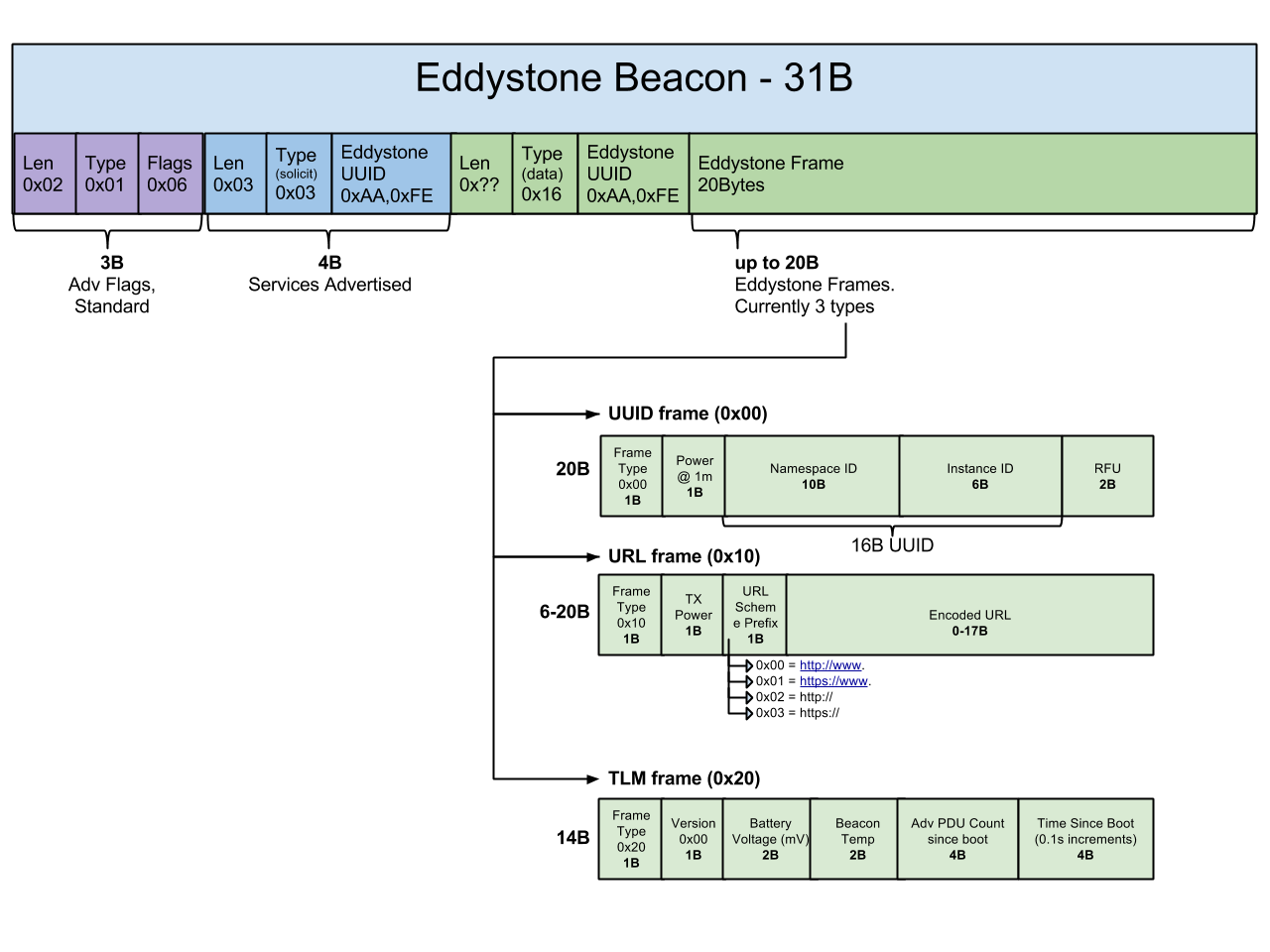Example program for the Eddystone Beacon service.
Dependencies: BLE_API mbed nRF51822 X_NUCLEO_IDB0XA1
Fork of BLE_EddystoneBeacon by
This example demonstrates how to set up and initialize a Eddystone Beacon. For more details on the Eddystone specification please see the Eddystone Github Page.
The Basics
An Eddystone Beacon is a Bluetooth Low Energy beacon, that means it does all of its data transfer in GAP advertising packets. Eddystone beacons, unlike other beacons, broadcast multiple types of data. Currently Eddystone beacons have 3 frame types (UID, URL, TLM) that will get swapped out periodically. This swapping of frame data allows Eddystone beacons to send many different types of data, thus increasing their usefulness over traditional beacons. Note that the UID frame type provides the same 16Bytes of UUID namespace that iBeacons do and the URL frame type provides the same functionality as a URIBeacon.
For more details see the Eddystone Specification.
Smartphone Apps
nRF Master Control Panel - this program recognizes Eddystone beacons and will display the data for all frame types.
Walkthrough of Physical Web application
Technical Details
The Eddystone Specification looks like the following image. Please note that this may change over time and for up to date information the official spec should be referenced.

The Eddystone Frames get swapped in and out depending on what frames you have enabled. The only required frame type is the TLM frame, all others are optional and you can have any number enabled. To disable the UID or URL frames give their values a 'NULL' in the Eddystone constructor. The Eddystone spec recommends broadcasting 10 frames a second.
Note
- The current Eddystone mbed example does not allow for combining the eddystone service with other services, this will be changes in a future update.
- There is an Eddystone Config service that allows for updating beacons in the field. We are working on an example for this, so keep your eyes pealed for a future update.
main.cpp
- Committer:
- Vincent Coubard
- Date:
- 2016-09-20
- Revision:
- 36:17b4a0ff9abb
- Parent:
- 34:f6d4a699a1ea
File content as of revision 36:17b4a0ff9abb:
/* mbed Microcontroller Library
* Copyright (c) 2006-2013 ARM Limited
*
* Licensed under the Apache License, Version 2.0 (the "License");
* you may not use this file except in compliance with the License.
* You may obtain a copy of the License at
*
* http://www.apache.org/licenses/LICENSE-2.0
*
* Unless required by applicable law or agreed to in writing, software
* distributed under the License is distributed on an "AS IS" BASIS,
* WITHOUT WARRANTIES OR CONDITIONS OF ANY KIND, either express or implied.
* See the License for the specific language governing permissions and
* limitations under the License.
*/
#include "mbed.h"
#include "ble/BLE.h"
#include "EddystoneService.h"
EddystoneService *eddyServicePtr;
void onBleInitError(BLE::InitializationCompleteCallbackContext* initContext)
{
/* Initialization error handling goes here... */
(void) initContext;
}
/*
* Update TLM frame battery voltage value.
*/
uint16_t tlmBatteryVoltageCallback(uint16_t prevBatteryVoltage)
{
prevBatteryVoltage++;
return prevBatteryVoltage;
}
/*
* Update TLM frame beacon temperature value.
*/
uint16_t tlmBeaconTemperatureCallback(uint16_t prevBeaconTemperature)
{
prevBeaconTemperature++;
return prevBeaconTemperature;
}
void bleInitComplete(BLE::InitializationCompleteCallbackContext* initContext)
{
BLE &ble = initContext->ble;
ble_error_t error = initContext->error;
if (error != BLE_ERROR_NONE) {
onBleInitError(initContext);
return;
}
/* Set UID and TLM frame data */
const UIDNamespaceID_t uidNamespaceID = {0x00, 0x11, 0x22, 0x33, 0x44, 0x55, 0x66, 0x77, 0x88, 0x99};
const UIDInstanceID_t uidInstanceID = {0xAA, 0xBB, 0xCC, 0xDD, 0xEE, 0xFF};
uint8_t tlmVersion = 0x00;
/* Initialize a EddystoneBeaconConfig service providing config params, default URI, and power levels. */
static const PowerLevels_t defaultAdvPowerLevels = {-47, -33, -21, -13}; // Values for ADV packets related to firmware levels, calibrated based on measured values at 1m
static const PowerLevels_t radioPowerLevels = {-30, -16, -4, 4}; // Values for radio power levels, provided by manufacturer.
/* Set everything to defaults */
eddyServicePtr = new EddystoneService(ble, defaultAdvPowerLevels, radioPowerLevels);
/* Set default URL, UID and TLM frame data if not initialized through the config service */
eddyServicePtr->setURLData("http://mbed.org");
eddyServicePtr->setUIDData(&uidNamespaceID, &uidInstanceID);
eddyServicePtr->setTLMData(tlmVersion);
/* Set battery voltage and temperature callbacks */
eddyServicePtr->onTLMBatteryVoltageUpdate(tlmBatteryVoltageCallback);
eddyServicePtr->onTLMBeaconTemperatureUpdate(tlmBeaconTemperatureCallback);
/* Start Eddystone in config mode */
eddyServicePtr->startBeaconService(5, 5, 5);
}
int main(void)
{
BLE& ble = BLE::Instance(BLE::DEFAULT_INSTANCE);
ble.init(bleInitComplete);
/* SpinWait for initialization to complete. This is necessary because the
* BLE object is used in the main loop below. */
while (ble.hasInitialized() == false) { /* spin loop */ }
while (true) {
ble.waitForEvent(); /* this will return upon any system event (such as an interrupt or a ticker wakeup) */
}
}


